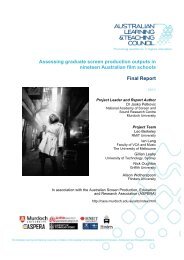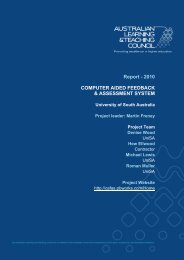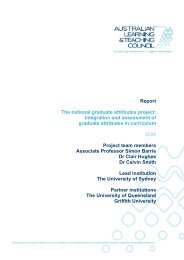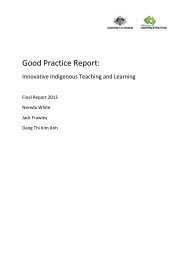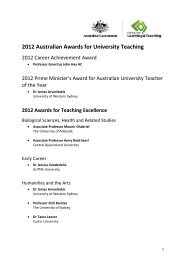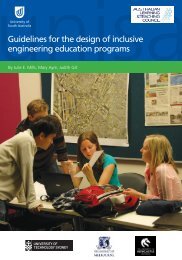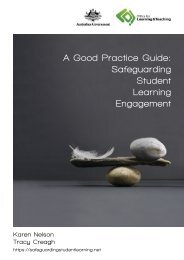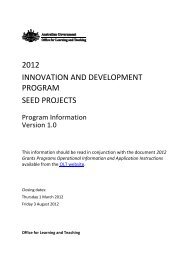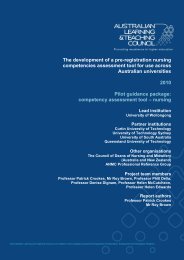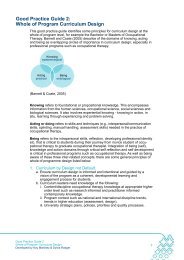7 Guidelines <strong>for</strong> Australian Universities <strong>and</strong> LecturersOur studies have identified various issues in the perspectives of teaching content<strong>and</strong> textbooks, teaching <strong>and</strong> learning methods, education management systems,language, culture <strong>and</strong> environment. It is recommended that Australian universitiespay more attention to the following issues to improve the learning <strong>and</strong> teachingpractices of Australian universities in consideration of an increasing internationalstudent cohort.We suggest an extended value chain concept could be applied to teaching <strong>and</strong>learning practices in Australian universities. An extended value chain includes threeparts: an upstream part, internal part, <strong>and</strong> downstream part. Under the upstreampart, teaching <strong>and</strong> learning activities focus on activities of preparing internationalstudents <strong>for</strong> their Australian dream. The focus of the internal part is on teaching <strong>and</strong>learning issues after they arrive in Australia. Long-lasting relationship building <strong>and</strong>life-long learning are some important goals in the downstream part.7.1 <strong>Teaching</strong> <strong>and</strong> learning should start be<strong>for</strong>e international students arrive attheir classroomsPre-study preparationInternational students should be well prepared <strong>for</strong> studying in Australian universitiesbe<strong>for</strong>e they start their study. One important aspect is to have an adequate level ofEnglish skills. While having acceptable results in an English test (i.e., IELTS,TOEFL) <strong>and</strong> other relevant tests e.g., GMAT <strong>for</strong> MBA degree, GRE <strong>for</strong> science <strong>and</strong>engineering degrees) is essential, it is only a starting point. Many other things canbe considered <strong>and</strong> done to better prepare them. For example, Asian students,especially Chinese students <strong>and</strong> students from other Asian countries whoseofficial/working language is not English, could possess quite good English reading<strong>and</strong> writing skills, but lack listening <strong>and</strong> speaking skills, which only can be developedin an English-speaking environment. Such an environment is very difficult to find inthose non-English speaking Asian countries. On the other h<strong>and</strong>, students comingfrom countries such as Malaysia, India, Singapore, Philippines, <strong>and</strong> Hong Kongnormally have better English skills (especially speaking <strong>and</strong> listening) than thosestudents from non-English speaking countries.Assistance with culture shockApart from the language problem, our study finds that another significant difficulty <strong>for</strong>international students is the culture shock. Most international students come from acultural background <strong>and</strong> education system which are significantly different fromAustralia. Familiarising themselves with the university environment <strong>and</strong> the socialenvironment could be time-consuming <strong>and</strong> a daunting task <strong>for</strong> many internationalstudents when they start their study. In addition, <strong>for</strong> some international students thefeelings of loneliness <strong>and</strong> helpless, as well as homesickness, could dramaticallydistract them from their studies in the beginning stage of their Australian life,especially <strong>for</strong> undergraduate students, most of who have never left their parents orcountry be<strong>for</strong>e.One key challenge <strong>for</strong> international students is to underst<strong>and</strong> <strong>and</strong> adapt to theAustralian way of teaching <strong>and</strong> learning, including issues such as teaching content<strong>and</strong> study materials, teaching <strong>and</strong> learning methods, <strong>and</strong> education managementsystems. For example, textbooks <strong>and</strong> teaching materials including lecture notes,extra readings <strong>and</strong> extra practices in China (particularly <strong>for</strong> under-graduatestudents) are basically prescribed <strong>and</strong> prepared by teachers <strong>and</strong> lecturers. Thosetextbooks <strong>and</strong> teaching materials are the bible <strong>for</strong> students. Many students will cramthose study materials be<strong>for</strong>e the final exams, <strong>and</strong> attending the weekly classes is127
perceived by them as something insignificant. However, local students may usestudy materials <strong>for</strong> key terms, key theories, case studies, practices, <strong>and</strong> treat themas reference materials, since they have been used to the idea of looking <strong>for</strong> theirown in<strong>for</strong>mation <strong>and</strong> ideas since childhood, which is not the case <strong>for</strong> Chinesestudents who have grown up in an environment that emphasises rote learning <strong>and</strong>spoon-feeding.Another dimension of the differences in teaching <strong>and</strong> learning practices betweenAustralian <strong>and</strong> Asian universities lies in the differences in culture. In the Asianculture, students greatly respect their teachers <strong>and</strong> lecturers. There is a saying inChinese “being my teacher once is being my teacher all my life”. The majority ofsuccessful graduates will greatly respect their teachers <strong>and</strong> lecturers all their life.They believe in such things as “when you can drink water, you should never <strong>for</strong>getwhere the water comes from”. Furthermore, there is a common view in Chineseculture that teachers <strong>and</strong> lecturers know more than students do. Such a view couldcome from the old belief of “among all career paths, study is the best way”, whichhas been seriously challenged since China embarked on economic re<strong>for</strong>m in 1979.As a result, Chinese students normally accept what is said <strong>and</strong> given by teachers<strong>and</strong> lecturers. Challenging teachers’ <strong>and</strong> lecturers’ views is not on many students’minds. Logically, many Chinese students feel more com<strong>for</strong>table with ateacher/lecturer-centred approach but not with the student-centred approach whichis appreciated by the local students.Cultural differences could also explain the unwillingness of many Chinese studentsto participate in class discussions. Another cultural factor is the importance of faceto the Chinese. Many Chinese believe on many occasions that “Silence is golden” -if they are not so sure what they are talking about or are trying to save others’ face,they prefer to listen carefully with two ears <strong>and</strong> watch closely with two eyes be<strong>for</strong>ethey open their only one mouth (in other words, they believe in “listen more, watchmore <strong>and</strong> speak less, since human beings have two ears <strong>and</strong> two eyes but only onemouth”). Of course, language ability <strong>and</strong>/or confidence in their language ability alsoplays an important role.Some issues in the perspectives of education management systems <strong>and</strong> teaching<strong>and</strong> learning practices could be attributed to the lack of experience of internationalstudents. Looking at students from Asian backgrounds, especially Chinese, quite alarge number of them are the only child in the family, <strong>and</strong> this family (on both thepaternal <strong>and</strong> maternal side) has been treating them as a prince or princess. Some ofthem have been spoiled. They have very limited or no experience of an independentlife, <strong>and</strong> when they are at school or university, almost everything, from admission,enrolment, course <strong>and</strong> subject selection, accommodation, daily life, graduation, hasbeen done or arranged <strong>for</strong> them by their parents <strong>and</strong>/or the school/tuniversity. Theybasically need to do nothing, or very little, when they commence their university life.Education is highly regarded in China. The majority of Chinese families will doeverything <strong>and</strong> sacrifice themselves to support their children’s education. Such aphenomenon has very deep roots in Chinese culture. For many Chinese parents, abetter future <strong>for</strong> their children is more important than their own future. At the sametime, many Chinese have the notion that “in the first half of my life my family will takegood care of me, <strong>and</strong> in the second half of my life it is my turn to look after myfamily”. As a result, being looked after by the family <strong>and</strong> getting financial supportfrom the family when they are undertaking study is not unusual. Of course, in recentyears such a notion has been challenged; many young people in China only want toreceive help <strong>and</strong> caring, not to help their families <strong>and</strong> others. There also exist manyChinese who are independent <strong>and</strong> not interested in helping others. It is not asurprise that many Chinese students (especially undergraduate students) lack theskills to be independent at university <strong>and</strong> in daily life. Furthermore, Chinese studentsgenerally lack experience of group activities, which are not normal practices withinChinese education systems. In respect of group activities, Chinese culture could128
- Page 1 and 2:
Strategies and Approaches toTeachin
- Page 3 and 4:
Table of Contents0 EXECUTIVE SUMMAR
- Page 5:
0 Executive SummaryAustralian terti
- Page 8 and 9:
1 Project OutcomesThe outcomes of t
- Page 10 and 11:
The identification information sect
- Page 12:
questions aim to discover their ass
- Page 15 and 16:
3.2 Literature reviewCross-cultural
- Page 17 and 18:
4 Survey Data AnalysisThis section
- Page 19 and 20:
Total Count 380 632 1012Percentage
- Page 21 and 22:
2 Count 12 30 42Percentage 3.1% 4.7
- Page 23 and 24:
Table 13 shows that nearly all loca
- Page 25 and 26:
methods are good, while less than h
- Page 27 and 28:
Preferredfewerlectures andmore labs
- Page 29 and 30:
Table 26 (Question III.4.D) Preferr
- Page 31 and 32:
Maindifferencesbetweenteachingmetho
- Page 33 and 34:
Table 33 shows that about half of l
- Page 35 and 36:
Table 38 (Question IV.4) Sufficient
- Page 37 and 38:
understanding lectures?Table 42 (Qu
- Page 39 and 40:
confident Count 301 179 480Percenta
- Page 41 and 42:
Table 49 (Question VI.4) Caring abo
- Page 43 and 44:
Table 52 shows that more local stud
- Page 45 and 46:
Table 56 shows that both local and
- Page 47 and 48:
a chi-square test to determine whet
- Page 49 and 50:
Significance Level (α= 0.05)Hypoth
- Page 51 and 52:
presentations are unrelated (Indepe
- Page 53 and 54:
Hypotheses V.2H0: Student category
- Page 55 and 56:
encountered at university in 2/3/4
- Page 57 and 58:
III.7What are you most concerned ab
- Page 59 and 60:
II.6.EII.6.FII.6.GTextbooks you pre
- Page 61 and 62:
VII. OtherVII.1.1VII.1.2What are th
- Page 63 and 64:
III.6 Do you like lecturers to ask
- Page 65 and 66:
distribution of these comments acro
- Page 67 and 68:
Figure 4.5 University of Sydney und
- Page 69 and 70:
Australia is the environment (11.06
- Page 71 and 72:
example, one student said that home
- Page 73 and 74:
5 Interview Data AnalysisThis secti
- Page 75 and 76:
class?Eight students thought studen
- Page 77 and 78: (1) Did you have any difficulty sel
- Page 79 and 80: 5.2 Staff interview data analysisA
- Page 81 and 82: (2) Do you think that the methods y
- Page 83 and 84: is the biggest problem”. One lect
- Page 85 and 86: comments was, “No, I send them to
- Page 87 and 88: lecturer, and one of them like the
- Page 89 and 90: am a shy person I am not comfortabl
- Page 91 and 92: When they have difficulties in read
- Page 93 and 94: (7) Have you been involved in many
- Page 95 and 96: Only two of the graduates had diffi
- Page 97 and 98: Furthermore, I was not familiar wit
- Page 99 and 100: ased communication style such as e-
- Page 101 and 102: CrosstabDifficultieswhenreadingtext
- Page 103 and 104: CrosstabPreferred workingin groups
- Page 105 and 106: CrosstabMain differencesbetween tea
- Page 107 and 108: CrosstabWhat are the maindifficulti
- Page 109 and 110: CrosstabDo you have anyEnglish lang
- Page 111 and 112: CrosstabDo you have anyEnglish lang
- Page 113 and 114: CrosstabAre you confidentabout your
- Page 115 and 116: CrosstabDo you have anyEnglish lang
- Page 117 and 118: CrosstabWhat are the mainstudy diff
- Page 119 and 120: Pearson Chi-SquareLikelihood RatioN
- Page 121 and 122: ead lecture notes.2. Regarding the
- Page 123 and 124: II.9 0.022 0.097 0.174 0.02 0.135II
- Page 125 and 126: From Table 65, we can see that ther
- Page 127: countries peoples. Personally, I fi
- Page 131 and 132: 7. Arrange peer groups for those st
- Page 133 and 134: covered (or not covered well) in th
- Page 135 and 136: 13. Ask assistance from internation
- Page 137 and 138: 11) • Weekly groupcase studies an
- Page 139 and 140: 8 Guideline for International Stude
- Page 141 and 142: life. However, it is very important
- Page 143 and 144: There are ways of maintaining focus
- Page 145 and 146: Expect to be nervous initially and
- Page 147 and 148: Avoid cheating and plagiarismAustra
- Page 149 and 150: 9 Disciplinary and interdisciplinar
- Page 151 and 152: 10 Results communication, publicati
- Page 153 and 154: Visiting Professor Javier Montero f
- Page 155 and 156: 11 ReferencesAsmar C. (1999), Schol



